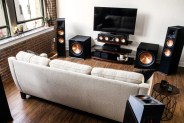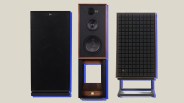Before buying any piece of audio equipment — specifically loudspeakers — it’s necessary to remember that your room is the single most important component in your stereo. Even the best stereo system in the world can fail to deliver the sonic experience you were expecting if it is set up in the wrong room, or in a setting without proper acoustic treatment.
Concert venues, houses of worship, movie theaters, and recording studios utilize acoustic treatment to minimize or eliminate acoustic issues and while there are domestic issues to consider in the home setting (is your spouse going to let you set up bass traps or absorption panels in your living room?) the reality is that every room has acoustic issues and there are reasonable solutions to make your new pair of loudspeakers sound even better than they did in the store.
Your Room and Its Acoustics: What to Know
Everything about your room matters: the shape, dimensions, surface materials, position of windows and doorways. Sound waves interact with the room and the objects within it as they travel to your ears. So before you buy anything, think about the type of loudspeaker you are considering and how it might interact with your room.
If you plan on using a typical living space, like a den or a living room, measure your room and determine how far back you will be sitting from the set-up location of your loudspeaker, and how far into the room you can set them up. If (like most of us) you have domestic considerations, it’s unlikely that you will be able to position your new pair of loudspeakers 3-to-5 feet from the wall which might allow them to sound best; more open, deeper and wider soundstage.
Modern homes often feature a lot of windows. This isn’t great for sound as the reflective nature of glass can negatively affect spatial cues and make your system sound very bright. There are solutions to this which we will discuss.
Room shape and dimensions have a critical impact on the bass response. Bass waves require space to unfold, but that doesn’t mean bass can’t sound great in a small room if you make some acoustic changes. Sound waves generated by your loudspeakers are either absorbed by objects in the room, reflect off surfaces within your room, or pass through the room itself into an adjoining space. A rectangular room is often better for acoustics than a perfectly square room for these reasons.


